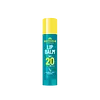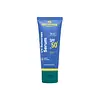What's inside
What's inside
 Key Ingredients
Key Ingredients

 Benefits
Benefits

 Concerns
Concerns

 Ingredients Side-by-side
Ingredients Side-by-side

Polyisobutene
Beeswax
Emulsion StabilisingHydrogenated Microcrystalline Wax
Emulsion StabilisingIsopropyl Myristate
EmollientCaprylic/Capric Triglyceride
MaskingStearyl Dimethicone
EmollientPolyethylene
AbrasiveOctyldodecanol
EmollientHomosalate
Skin ConditioningEthylhexyl Methoxycinnamate
UV AbsorberC26-28 Alkyl Dimethicone
Skin ConditioningEthylhexyl Salicylate
UV AbsorberButyl Methoxydibenzoylmethane
UV AbsorberParfum
MaskingPolyester-7
Skin ConditioningButyrospermum Parkii Butter
Skin ConditioningHelianthus Annuus Seed Oil
EmollientNeopentyl Glycol Diheptanoate
EmollientPhenoxyethanol
PreservativePetrolatum
EmollientBHT
AntioxidantTocopheryl Acetate
AntioxidantEthyl Ferulate
AntioxidantBisabolol
MaskingAscorbyl Tetraisopalmitate
AntioxidantIsohexadecane
EmollientTocopherol
AntioxidantRosmarinus Officinalis Leaf Extract
AntimicrobialEthylene/Propylene/Styrene Copolymer
Butylene/Ethylene/Styrene Copolymer
Xanthan Gum
EmulsifyingSodium Hyaluronate
HumectantTripeptide-1
Skin ConditioningPolyisobutene, Beeswax, Hydrogenated Microcrystalline Wax, Isopropyl Myristate, Caprylic/Capric Triglyceride, Stearyl Dimethicone, Polyethylene, Octyldodecanol, Homosalate, Ethylhexyl Methoxycinnamate, C26-28 Alkyl Dimethicone, Ethylhexyl Salicylate, Butyl Methoxydibenzoylmethane, Parfum, Polyester-7, Butyrospermum Parkii Butter, Helianthus Annuus Seed Oil, Neopentyl Glycol Diheptanoate, Phenoxyethanol, Petrolatum, BHT, Tocopheryl Acetate, Ethyl Ferulate, Bisabolol, Ascorbyl Tetraisopalmitate, Isohexadecane, Tocopherol, Rosmarinus Officinalis Leaf Extract, Ethylene/Propylene/Styrene Copolymer, Butylene/Ethylene/Styrene Copolymer, Xanthan Gum, Sodium Hyaluronate, Tripeptide-1
Water
Skin ConditioningEthylhexyl Salicylate
UV AbsorberOctocrylene
UV AbsorberHomosalate
Skin ConditioningGlycerin
HumectantPropylene Glycol
HumectantNylon-12
Cyclopentasiloxane
EmollientBis-Ethylhexyloxyphenol Methoxyphenyl Triazine
Skin ConditioningGlyceryl Stearate
EmollientPolymethyl Methacrylate
Silica
AbrasivePhenoxyethanol
PreservativeCeteareth-20
CleansingCeteareth-12
EmulsifyingCetearyl Alcohol
EmollientCetyl Palmitate
EmollientSodium Laureth Sulfate
CleansingDimethicone/Vinyl Dimethicone Crosspolymer
Skin ConditioningAcrylates/C10-30 Alkyl Acrylate Crosspolymer
Emulsion StabilisingTriethanolamine
BufferingTriethylene Glycol
MaskingAminomethyl Propanol
BufferingHelianthus Annuus Seed Oil
EmollientPicea Mariana Bark Extract
AntioxidantEthyl Ferulate
AntioxidantRosmarinus Officinalis Leaf Extract
AntimicrobialTocopherol
AntioxidantEriophorum Spissum Flower/Stem Extract
Skin ConditioningWater, Ethylhexyl Salicylate, Octocrylene, Homosalate, Glycerin, Propylene Glycol, Nylon-12, Cyclopentasiloxane, Bis-Ethylhexyloxyphenol Methoxyphenyl Triazine, Glyceryl Stearate, Polymethyl Methacrylate, Silica, Phenoxyethanol, Ceteareth-20, Ceteareth-12, Cetearyl Alcohol, Cetyl Palmitate, Sodium Laureth Sulfate, Dimethicone/Vinyl Dimethicone Crosspolymer, Acrylates/C10-30 Alkyl Acrylate Crosspolymer, Triethanolamine, Triethylene Glycol, Aminomethyl Propanol, Helianthus Annuus Seed Oil, Picea Mariana Bark Extract, Ethyl Ferulate, Rosmarinus Officinalis Leaf Extract, Tocopherol, Eriophorum Spissum Flower/Stem Extract
 Reviews
Reviews

Ingredients Explained
These ingredients are found in both products.
Ingredients higher up in an ingredient list are typically present in a larger amount.
Ethyl ferulate is an antioxidant derived from ferulic acid and ethyl alcohol. You'll most likely see this ingredient in sunscreens.
One study from 2014 found a concentration of 10% showed a similar SPF to Benzimidazole. Though this is considered a chemical UV filter, this ingredient is not listed as so. This is due to regulatory loopholes. You'll likely find this ingredient in "100% mineral" sunscreens.
This ingredient is typically found in concentrations between 0.5-1%. It is usually created synthetically or from rice bran oil.
Learn more about Ethyl FerulateEthylhexyl Salicylate is an organic compound used to block UV rays. It primarily absorbs UVB rays but offers a small amount of UVA protection as well.
Commonly found in sunscreens, Ethylhexyl Salicylate is created from salicylic acid and 2-ethylhexanol. You might know salicylic acid as the effective acne fighter ingredient and BHA.
The ethylhexanol in this ingredient is a fatty alcohol and helps hydrate your skin, similar to oils. It is an emollient, which means it traps moisture into the skin.
According to manufacturers, Ethylhexyl Salicylate absorbs UV wavelength of 295-315 nm, with a peak absorption at 307-310 nm. UVA rays are linked to long term skin damage, such as hyperpigmentation. UVB rays emit more energy and are capable of damaging our DNA. UVB rays cause sunburn.
Learn more about Ethylhexyl SalicylateHelianthus Annuus Seed Oil is the oil derived from the seeds of a Sunflower. Sunflower seed oil is non-fragrant. It is an emollient, meaning it helps to soften the skin.
Sunflower seed oil contains many fatty acids. The fatty acids found in sunflower seeds include (from highest amount to least): linoleic acid, myristic acid, palmitic acid, stearic acid, arachidic acid, oleic acid, and linolenic acid.
These fatty acids help the skin create ceramides. Ceramides play a role in repairing the skin barrier.
Helianthus Annuus Seed Oil helps moisturize the skin. This in turn helps the skin look more rejuvenated and smoother.
Sunflowers are rich in vitamin E.
Historians believe Indigenous cultures of North America domesticated sunflowers before corn. Thus they relied on sunflower oil for a variety of uses. One such use is moisturizing skin and hair.
Sunflower seed oil may not be fungal acne safe. We recommend speaking with a professional if you have any concerns.
Learn more about Helianthus Annuus Seed OilHomosalate is a chemical sunscreen filter that provides protection in the UV-B range (280nm - 320 nm), with a peak protection at 306 nm. It is internationally approved for use in sunscreens.
Homosalate is not photo-stable, meaning it's strength as a UV filter degrades over time with exposure to the sun. Because of this, it's often used in combination with other chemical sunscreen filters as avobenzone (which protects from the UV-A range). Homosalate also helps act as a solvent for harder-to-dissolve UV filters.
(Part of the reason that sunscreens need to be frequently re-applied is due to the photo instability of many chemical sunscreen filters)
Currently, homosalate is approved in concentrations up to 10% in the EU and 15% in the US. The FDA is currently doing further research on the effects of homosalate, and it is possible that these approved concentrations will change in the future.
Learn more about HomosalatePhenoxyethanol is a preservative that has germicide, antimicrobial, and aromatic properties. Studies show that phenoxyethanol can prevent microbial growth. By itself, it has a scent that is similar to that of a rose.
It's often used in formulations along with Caprylyl Glycol to preserve the shelf life of products.
Rosmarinus Officinalis Leaf Extract comes from rosemary. Rosemary is native to the Mediterranean.
While Rosmarinus Officinalis Leaf Oil can be volatile due to its fragrant properties, the fragrance components are usually removed in the leaf extract.
Rosemary Leaf Extract contains many antioxidants such as rosmarinic acid and caffeic acid. Rosemarinic acid, a compound found in rosemary leaf, has been found to help soothe skin conditions such as eczema and acne.
Learn more about Rosmarinus Officinalis Leaf ExtractTocopherol (also known as Vitamin E) is a common antioxidant used to help protect the skin from free-radicals and strengthen the skin barrier. It's also fat soluble - this means our skin is great at absorbing it.
Vitamin E also helps keep your natural skin lipids healthy. Your lipid skin barrier naturally consists of lipids, ceramides, and fatty acids. Vitamin E offers extra protection for your skin’s lipid barrier, keeping your skin healthy and nourished.
Another benefit is a bit of UV protection. Vitamin E helps reduce the damage caused by UVB rays. (It should not replace your sunscreen). Combining it with Vitamin C can decrease sunburned cells and hyperpigmentation after UV exposure.
You might have noticed Vitamin E + C often paired together. This is because it is great at stabilizing Vitamin C. Using the two together helps increase the effectiveness of both ingredients.
There are often claims that Vitamin E can reduce/prevent scarring, but these claims haven't been confirmed by scientific research.
Learn more about Tocopherol